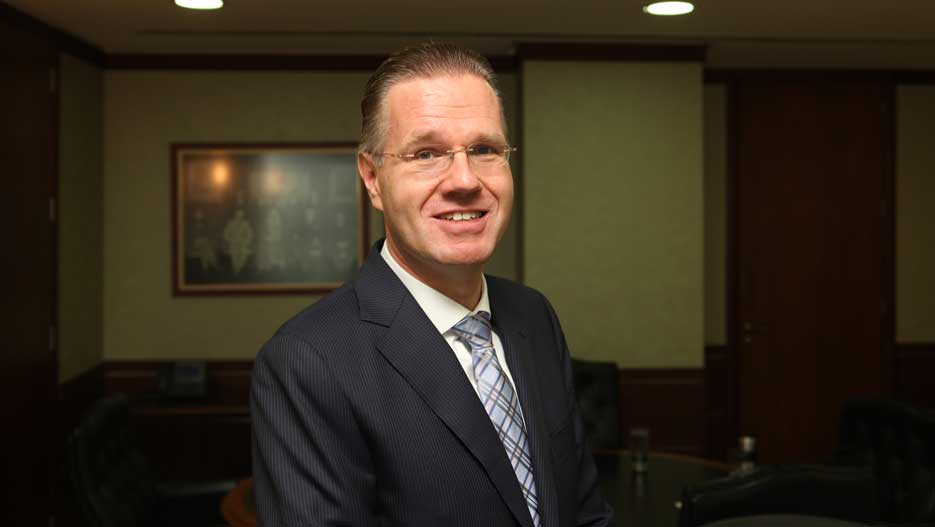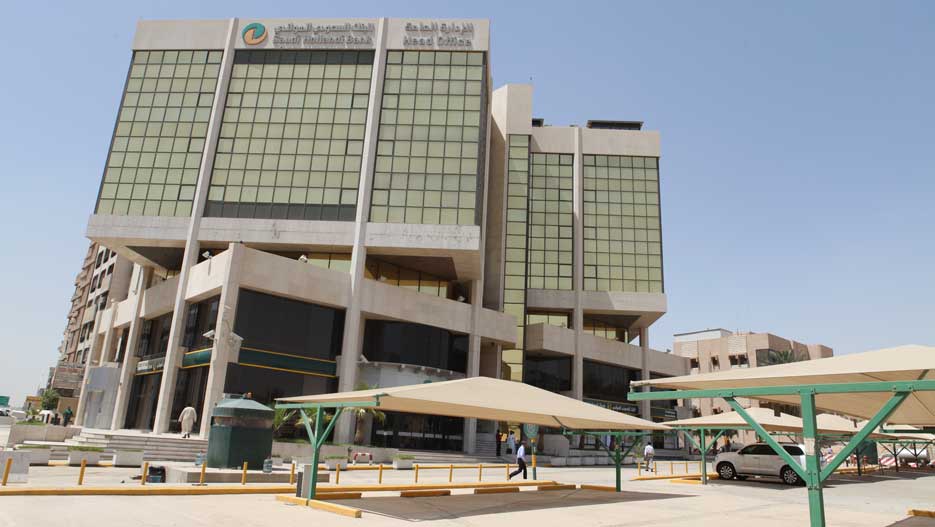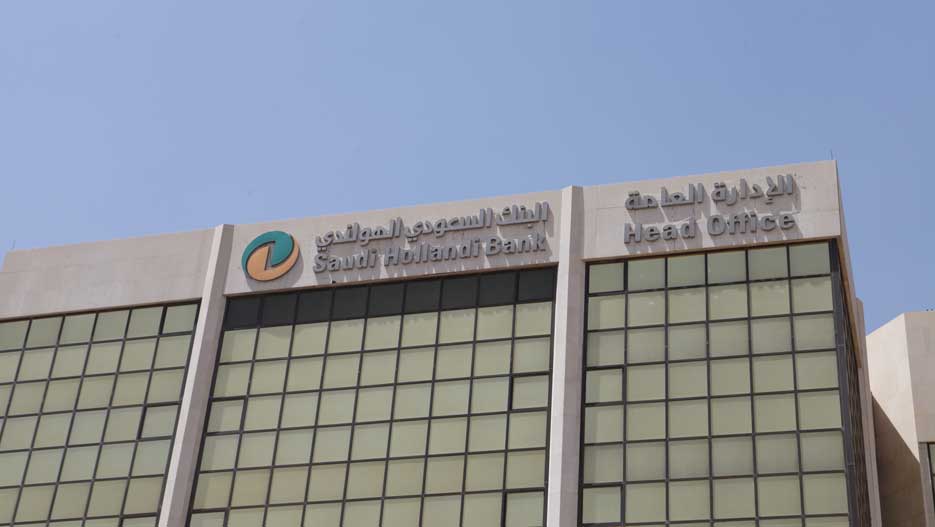Saudi Banking Sector is Strong, Banks Focusing on SMEs
Dr. Bernd van Linder, Managing Director of Saudi Hollandi Bank
The banking sector in Saudi Arabia is, of course, connected to the Saudi economy, and the economy in the kingdom is doing extremely well on the backdrop of huge public sector investments, as well as growth of SMEs and rapidly expanding middle class.
Interview with Dr. Bernd van Linder, Managing Director of Saudi Hollandi Bank

To begin with, what is your general assessment of the banking sector in Saudi Arabia?
The banking sector in Saudi Arabia is, of course, connected to the Saudi economy, and the economy in the kingdom is doing extremely well on the backdrop of huge public sector investments, as well as growth of SMEs and rapidly expanding middle class. There are other positive developments. The banking sector mirrors the economy, so the outlook is extremely bullish.
The banking sector in Saudi Arabia is, of course, connected to the Saudi economy, and the economy in the kingdom is doing extremely well
What are the trends that you can observe happening in the sector?
There are five main drivers that make it a particularly strong economy: firstly, you have substantial capital investments made by both the government and private companies. Secondly, there is the strong non-oil GDP growth. On the one hand, this requires support from the banks, on the other hand, it enables the banks to grow as well. Thirdly, there is the focus on SMEs. This is a partnership between the government, private institutions, banks, chambers of commerce – many institutions are involved and this focus on SMEs will be very positive for the kingdom, as well as for the banks in the Kingdom. Fourthly, there is the growth of the Saudi middle class. Helped by the focus on Saudization, the middle class is experiencing strong growth and this middle class will require all kinds of banking services including, for example, home finance, which as a product is still very low compared to GDP. Lastly, there are the overall very positive demographics. Saudi Arabia’s young population holds great potential for the future. Over the past 30 years, the Saudi population has grown at an average annual rate of about 3.75%, compared to 1.83% for other developing countries. Among Saudi nationals, who account for about 75% of the total population, close to 48% are 19 years old or younger.
Now, looking to the future, what is the outlook for the banking sector?

Based on all of these developments, I think the outlook is very positive. There is a substantial amount of competition between the twelve domestic banks. Despite intense competition, the outlook for the banking sector is optimistic, mainly due to strong economy.
In terms of growth, what is your estimate?
Last year, the credit growth accelerated to reach 14% – 15%. I would expect something similar for this year for the sector as a whole. As Saudi Hollandi, we want to outgrow the sector, so we are aiming at something between 15% – 20% growth this year.
Last year, the credit growth accelerated to reach 14% – 15%.
Which products do you think will be the future drivers of growth for the banks in the kingdom?
It is essentially across the board. When you look at the drivers for the economy, you will see a demand for many types of banking products. You will see a demand for large product financing – syndicated financing – and you will see a demand for equity IPOs, as well as a substantial demand for home finance, for personal loans, for corporate finance, for capital investments and for working capital facilities. The economy is essentially growing across all sectors and banks are growing with it. In the future, there will be a demand for all types of banking products.
How do you see the profitability of banks in the kingdom?
The Saudi economy is among the best performing in the world, and I believe the banking sector is also among the best in the world. Saudi banks are typically doing very well, are very strong, very stable, very profitable. I don’t see that changing. Having said that, we need to know that there is a substantial competition between the Saudi banks. I don’t think this will have a major impact on profitability, but it is something that Saudi banks have to live with.
According to latest statistics, there were 23 commercial banks operating in Saudi Arabia as of 2012. It’s a very competitive market, perhaps one of the most competitive markets in the Middle East. What makes you stand out from your competitors?
You’re absolutely right; it’s an extremely competitive market. Saudi banks are very competitive in providing products and services to their customers. As Saudi Hollandi, we have decided that our main competitive advantage is customer service. We have a strong focus on the customer. We were the first bank in the kingdom of Saudi Arabia, operating as a bank for the past 88 years. We are very close to our customers and we have stood by them throughout several credit cycles, through the good times and the bad times. This focus on relationship management, we believe, will be our main competitive advantage.
And how do you structure your strategy? Where would you like to place your strategic focus?
As a bank, we are traditionally known to be very good at servicing large corporates. We have had this reputation for a long time and we want to continue to be good at doing this. This is a major part of our strategy. The bank’s strategy is to focus on expansion to mid-market corporates and SMEs, and retail banking as well. The last two areas in particular are very important.

Saudi Hollandi bank has become very competitive in providing finance and banking services to SMEs, and today, we are among the top banks in this market segment. Numerous local and regional awards that the bank won is the testament to this status.
SMEs are the backbone of any well-functioning economy. We believe this is an important segment for the kingdom as a whole, and for Saudi Hollandi in particular. In retail banking, we are making steady headway and becoming a major force in home finance. We are one of the fastest growing banks, we are recognised as doing extremely well in home finance, and we want to accelerate our expansion. We want to provide more banking services to more regional banking customers.
What do you think is the biggest challenge in the market?
As in every market, the biggest challenge is making sure you provide the products and services that customers need at the time that they need them. We’ve been investing heavily in expanding all of our channels. We have expanded our branch network by around 20% over the last two years, we’ve made substantial investments in internet banking, in mobile banking, and we believe that providing this “anywhere – any time – any place” type of services is key to being competitive. The main challenge will be to differentiate yourself from the very strong competition.
You also referred to building your brand?
We already have a very strong brand on the corporate side, and increasingly, our brand is recognised on the retail side of the business as well. It is a very strong brand in SME banking, and we have won local and regional awards for this. With further expansion of our business, there will be further brand recognition.
Can you tell us about the latest developments in internet banking? Are Saudis using it widely? The penetration rate has reached 40%. Are they starting to use e-banking services?
Saudi Arabia, being a very young and very technology-savvy society, is an ideal ground for Internet banking. What we have seen is very fast-growing usage of our internet banking channels, and even faster growth of our mobile applications. The future will be in providing all these channels and making sure that you have a customer experience which is seamless across all of these channels. Adoption of internet banking, of mobile banking, on tablets as well as Smartphones has been growing extremely fast.
Can you tell us a bit more about Saudization in the banking sector? How do you approach this issue yourself?
The Saudi banking sector has been among the most successful when it comes to Saudization. Saudi Hollandi, as a bank, has been operating at Saudization levels – close to 90% – for quite some time already. The key to being successful in Saudization, we believe, is to attract good Saudi graduates. The bank’s strategy is to focus on management trainee programmes. We are now running four different management trainee programmes. In addition to our general management trainee programme, we have one focused on SMEs, one focused on retail banking, and one focused on information technology. Across these four management trainee programmes, we attract 50 to 60 fresh graduates every year. The plan is to expand our training capabilities because attracting, retaining, and developing the right Saudi talent from an early stage is the key to being successful.
What should be done to stimulate lending to SMEs and on housing?
For home finance, the banks and the dedicated mortgage companies are already extremely active in the market. The new mortgage law is very strong and supportive. All the elements are in place.
With regard to SME banking, we are strong supporters of SME banking. We believe that cooperation between the government, private sector, the banks, and the chambers of commerce will lead to further growth in this sector. One of the key elements is the Kafalah Guarantee Programme. Saudi Hollandi is a firm believer and a strong supporter of this programme, and we believe that it will help to further expand this sector.
This sector is key to job creation everywhere in the world, and it will be no different in the kingdom of Saudi Arabia. With the support of the government and governmental institutions, and as the banks work very closely with them, I am very positive that we will see some very strong growth in this sector.
And you of course want to be the leading bank in providing services to SMEs?
The bank’s vision is to be the leading SME bank in the Kingdom. It’s a segment, where scale is not a disadvantage. Saudi Hollandi bank has provided banking services to SMEs for over 80 years. Two years ago, we established SME banking as separate business unit. We’ve opened seven dedicated SME centres throughout the kingdom, from which we serve the SME customers. We have about 50 dedicated relationship managers for this segment. Finally, our recognition emanates from the numerous accolades that the banks has won. We are aiming to be a top bank for SMEs.
Regarding the regulatory framework, how does it compare to other countries, and what legislation could be adopted to further improve this sector?
As a listed bank, as a listed company, we deal with both SAMA – the Saudi Arabian Monetary Agency – and CMA, the Capital Markets Authority. I would say that both of them are highly professional and highly reputable regulators who are governed in accordance with international best practices, in many areas they are ahead of their regional and international peers. For example, all Saudi banks are Basel III compliant, and have been so for many months already of the official deadline. We were probably the first country in the world to have all of its banks Basel III compliant. I believe both SAMA and the CMA are at the forefront of all the regulatory developments and provide strong support to the Saudi banking sector.
I have read that some of the banks strengthened their position by issuing sukuk to raise capital. Can you talk about this issue?
Saudi Hollandi has been very active in subordinated sukuk issue. We’ve done a total of four issues now. We believe sukuk are a good instrument to increase your tier 2 capital, and we’ve been using it heavily. As I mentioned, the economy is growing fast and we are committed to capture every opportunity offered by this market. The most recent sukuk issue was at the end of last year, and we believe that this is a very valuable addition to the tier 1 and to the equity capital.
Do you have any international ambitions with the SMEs, perhaps growing out of Saudi Arabia, and this being the preferred bank for them abroad as well?
We will always try to serve our customers wherever our customers want us to be, but for the moment, we believe that given the attractiveness of the Kingdom, given the opportunities for growth in the kingdom, that is really the most attractive market that we can think of. The focus for the upcoming years is on Saudi Arabia.
Finally, could you share with us your larger vision for Saudi Hollandi? Where would you like to see yourself in five years time?
In five years, we would like to be seen as the best universal bank in the Kingdom of Saudi Arabia. Our brand already enjoys a strong reputation as the best bank for large corporate clients. The ambition is to expand, to further build our reputation and also to become the best bank for mid-market corporates, for SMEs, and in retail banking as well.
We will have a bigger footprint than we have today in terms of branches, ATMs and other channels. We will have a very strong proposition combining all the elements we have in the bank, from a client perspective, a product perspective, our treasury business, our trade business, our investment banking business, and our bank assurance business, all joining together to provide the best possible to service to large corporates, mid-market corporates, SMEs and our retail banking customers.